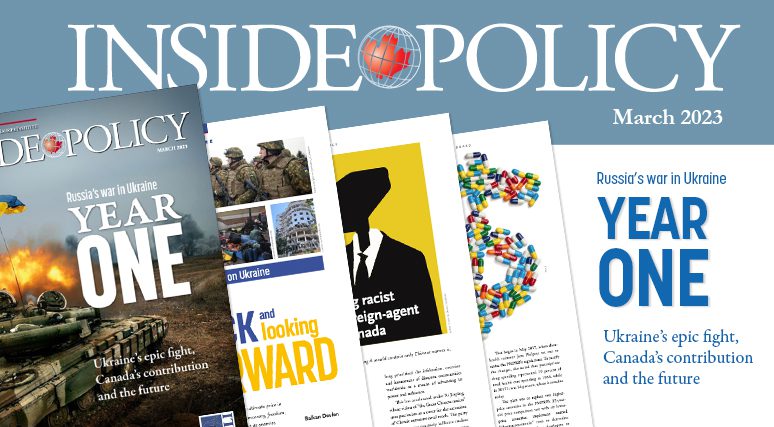Inside Policy
March 30, 2023
From the editors
In February 2022, Russia launched an unprovoked, unjustifiable, and wholly aggressive assault on Ukraine. While failing dramatically to topple the government in Kyiv, Russia’s invasion succeeded in finally waking NATO to the threat posed by the Kremlin, uniting global democracies and inspiring a massive realignment of international cooperation.
One year later, the frontline in eastern Ukraine remains tense, with Russian forces encircling Bakhmut and Ukraine preparing for a military counter-offensive in the spring.
To lead our cover feature, we are pleased to have an article by Balkan Devlen that explores the international dimensions of the war in Ukraine, where he identifies five lessons from the first year of the war and five things that will not happen in 2023.
In addition, Alexander Lanoszka looks at Canada’s military assistance to Ukraine and questions the extent to which even this limited aid can continue, and Matthew Bondy turns to the dangers of war fatigue in the West, with a particular emphasis on the need for both an energy realignment and military rearmament.
Even as the West confronts the threat posed by Putin’s Russia, we would do well to remember the strategic challenge posed by Communist China. Indeed, recent Canadian media reports show the extent to which Chinese foreign interference has taken place in the 2019 and 2021 federal elections in Canada. Charles Burton and Marcus Kolga look at what the government is doing (or not doing) to protect Canadian democracy, while David Mulroney makes the case for a foreign registry. And, following President Biden’s visit to Canada, MLI Managing Director Brian Lee Crowley has some pointed words about Canada’s security, intelligence, and military failings.
As the world confronts an energy crisis triggered by Russia’s invasion of Ukraine, Canadian policy-makers would do well to remember the benefits offered by its oilsand production. According to Heather Exner-Pirot, while US shale fields will soon plateau, Canada in contrast has plenty of oil left in the tank.
This is good news for the Indigenous peoples of Canada. As Melissa Mbarki points out, many Indigenous communities have an opportunity to prosper in this sector. Indeed, according to Ken Coates and JP Gladu, with Indigenous peoples gaining control of traditional lands, they are in a position to make real change. Yet that is only true so long as federal government policies, such as the carbon tax, don’t make life on reserves harder than they need to be – a point raised by Stephen Buffalo.
This issue concludes with articles by Bruce Pardy on how lawyers must vote against the woke onslaught, Aaron Wudrick on the need for fair and constructive immigration reform in Canada, and Nigel Rawson on Canada’s unmet health needs.







